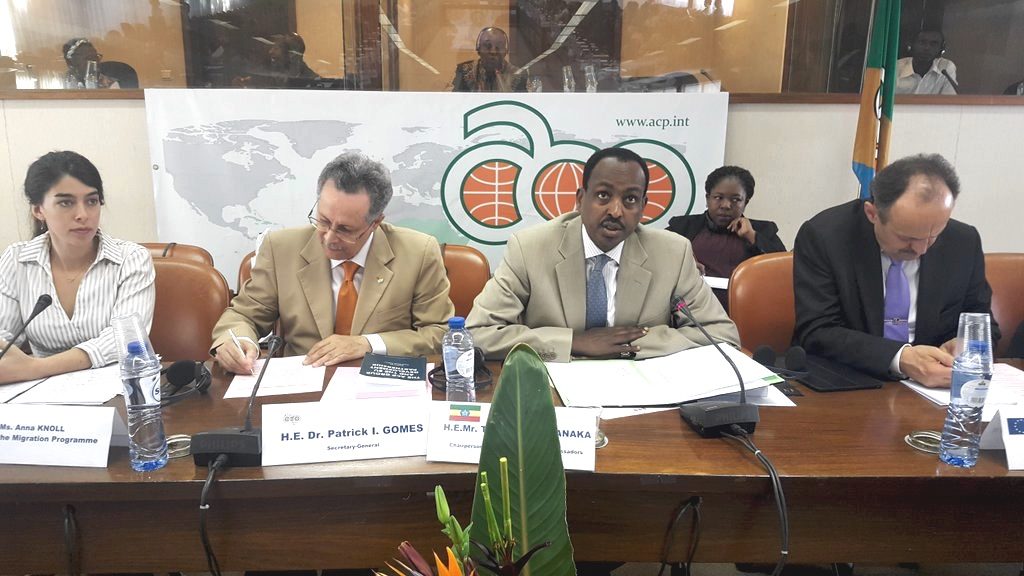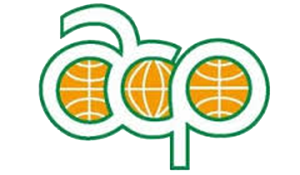This article was originally published in the 7th issue (July 2017) of The Ethiopian Messenger, the quarterly magazine of the Embassy of Ethiopia in Brussels.
H.E Ambassador Teshome Toga Chanaka is presiding over the Committee of Ambassadors of the African, Caribbean and Pacific (ACP) Group for the period 1st of February 2017 – 31st of July 2017. As the partnership between the ACP Group of States and the EU is entering a critical phase, Ethiopia’s presidency will contribute to shape future relations between the ACP and the EU.
Towards a united and stronger ACP
With the upcoming expiration of the Cotonou Partnership Agreement, which frames cooperation between the European Union and the ACP Group of States, the ACP is reflecting not only on the future of its relationship with the EU, but also on the future of the Group itself. As current chair of both the ACP Council of Ministers and the Committee of Ambassadors, Ethiopia is determined to do its level best to help the ACP Group to obtain a mutually beneficial agreement with the EU.

ACP countries have made significant strides that should be taken into account in the upcoming negotiations. Several ACP countries are now middle-income countries and democratisation has progressed in most member states. Both sides are still developing their negotiating positions, but for the ACP, one thing seems certain: the ACP will continue as a solid united group. The collective strength of the ACP Group derives from decades of inter-regional solidarity, international trade negotiations, development cooperation, political dialogue, and relations with other international organisations. Relations between the European Union and the ACP Group of States are also one of the most enduring features of contemporary international relations. Geopolitical developments did not weaken the bloc; on the contrary, its membership has grown considerably.
But it is also fundamental to modernise the ACP Group and make it more pertinent for the ACP peoples. Ethiopia believes in a united, reshaped ACP group that could challenge traditional thinking and practices on sustainable development to promote inclusive growth and structural transformation of our economies.
A renewed partnership with the EU
Changes in the global economic and geopolitical context and profound transformations undergone by the EU since the signature of the agreement in 2000 have had a significant impact on relations between the EU and the ACP group. It is therefore essential to adapt the partnership to 21st century realities, and this will require no less than a paradigm shift in the way the relationship was conceived so far.
Over the years, ACP-EU relations moved away from a donor- recipient relation as ACP countries became more involved in the disbursement of funds, and the partnership acquired a political dimension. However, the Cotonou Partnership Agreement focused very much on development aid.
ACP countries want to trade more with Europe to industrialise, move up their value chains, and ultimately radically transform the structure of their economies. Any modern partnership in development should help ACP countries to rely on trade rather than aid to develop. But a modern ACP group should also look beyond the EU. Reaching new markets will require to increase the competitiveness of ACP economies.
Therefore, this paradigm shift should come first and foremost from within the ACP countries. There is an agreement within the Group that the ACP Secretariat should be reinforced, better staffed and streamlined along core political objectives – a view that lies at the core of Ethiopia’s presidency. A long-time supporter of the ACP’s unity and solidarity, Ethiopia believes that the ACP group can and should take responsibility for its own future by consolidating and negotiating as a united group to ensure that the next framework will give rise to a better agreement with the EU. Only a strong ACP group will be able to shape policy outcomes and lobby on essential issues such as tackling climate change, implementing the sustainable development goals or managing natural resources and renewable energies.
Particular attention is currently drawn on the nature of the partnership with the EU. Over the years, the ACP-EU relationship has extended to new key issues such as the fight against climate change, counter-terrorism, migration and mobility. Given the increasing number of common challenges, that neither the EU nor the ACP can face alone, equality, mutual respect and mutual interests should be the governing principle of our future partnership.
A three-pillar cooperation
In order to adapt the ACP group to current challenges, three major pillars were determined for the ACP’s future partnership with the EU, intra-ACP cooperation and also the South-South and Triangular cooperation.
The first pillar focuses on issues related to trade, investment and private sector. This will allow ACP countries to industrialise, create jobs in particular for the younger generations, and create jobs. New partners beyond the EU will also be targeted to take advantage of opportunities offered by the emergence of new partners.
The second pillar deals with development cooperation, which is an important part of our partnership. Development cooperation, which for years has been the backbone of the
Cotonou Partnership Agreement (CPA), has considerably improved under Cotonou with respect to the absorption of funds, aid implementation and results. To make sure this new development cooperation ensures social and economic progress and development in our countries, new dimensions such as science and technology were added to this pillar.
The third pillar is a new policy dialogue and advocacy. Political dialogue was a pillar of the Cotonou Partnership Agreement and will remain an important dimension of its successor. However, political dialogue was the weakest dimension of the CPA and has often failed to deliver the expected political outcomes. The ACP believes that a meaningful policy dialogue is vital in overseeing the partnership and will make sure it can contribute to shape the political agenda in significant ways.
The way forward
Over the past 42 years, the relationship between the EU and ACP countries went through continuous changes with its ups and downs. But when looking at the relationship from a long-term perspective, its benefits are significant. While the EU aims at becoming a more effective global player, it is obvious that it will remain a very strategic partner. The ACP, for its part, will turn into an international alliance of developing countries. The organization is currently repositioning itself for more strategic engagements with regards to its future and is determined to put an emphasis on re-positioning the ACP group as an effective player in a challenging global landscape.
In the future, the ACP Group will increasingly relate to the regional groupings (CARICOM, Pacific Forum, AU, etc), as regional groups play a very important role in global governance. This will make the ACP Group more efficient and more pertinent, as some issues can seem remote to ACP, but are pertinent problems into the regional groups. By avoiding duplication and delegating some matters to regions, the added value of the ACP in global forums will be increased, which could make a big difference in global decision making.
The best example of this was the COP21 in Paris, when at a crucial point in time at the negotiations, the 79 ACP countries and the EU joined up to swing the momentum of the negotiations. The group can also play an important role during COP23, that will be chaired by Fidji, one of the ACP’s member States.
The EU itself believes in keeping the Group together. Asked about the future of ACP-EU relations, Koen Does, Director East and Southern Africa and ACP coordination at the European Commission stated: “Why is keeping the group together so important? […] because this is also what our partners want. […] We have seen that there is an unexploited potential in this relationship between the EU and the ACP, when it comes to joining forces to weigh on and influence the global agenda.”
There are numerous topics on the global agenda where the EU and its ACP partners see eye-to-eye. If the future partnership manages to encapsulate this, and if the ACP timely implements expected reforms, there is no doubt the Group could become a formidable global player.




